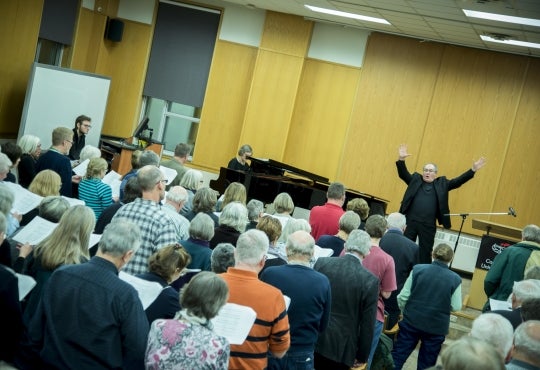In preparation for the approaching 40th anniversary of Peace and Conflict Studies in 2017-18, the PACS department at Grebel has been looking back at the program’s history and looking forward to the future.
As part of this process, PACS staff and faculty members participated in the 11th International Conflict Resolution Education conference on the topic of Tools for Preparing the Change Leaders of the Future: Social Enterprise, Innovation and Education. Sue Baker, Kelly Brown, Rachel Reist, Lowell Ewert, and Jennifer Ball traveled to Ohio State University as the Canadian delegation at the international conference, held
March 16-17, 2017.
The team presented a panel on “Teaching Peace at the University of Waterloo,” reflecting on the origins and growth of the program over the last four decades. They explored the reasons for the long-term success of the program and the challenges experienced, and they shared how Grebel’s approach to teachingpeace is unique and creates excellent graduates.
Some audience members were starting or reigniting programs on their own campuses and said that they had been inspired by the approach used in Grebel’s program. Attendeesmentioned that learning more about the vision and structure of the program had given them new ideas for rebuilding or starting their own programs.
The PACS program at Grebel was the first of its kind in Canada and is now one of the largest peace studies programs in North America. It focuses on teaching peace through investing in and actively fostering life-long learning, community building, global engagement, compassionate service, active peacemaking, and responsible citizenship. This holistic approach to teaching peace goes beyond traditional classroom learning by integrating internships, alternative assignments, and practical skill development into traditional academic learning.
Sharing the experiences of 40 years of building the PACS program with others looking to start their own peace studies programs was a valuable outcome from the panel presentation. By discussing ways to build strong peace studies programs, the hope is that more programs such as ours will be started and the field of peace education will continue to grow and flourish. The more peace studies programs that spring up throughout the world, the more we will see community building, global engagement, compassionate service, active peacemaking, and responsible citizenship amongst citizens.
Igniting imaginations for a shared vision of peace studies programs in more and more university campuses is reflective of the work done by PACS over the last 40 years, and of the hope for the next 40 years of teaching peace.
Teaching Youth that Peace is Possible
We all play a part in peace. Peace Camp is a great opportunity to inspire youth to get involved in social justice in the community.






